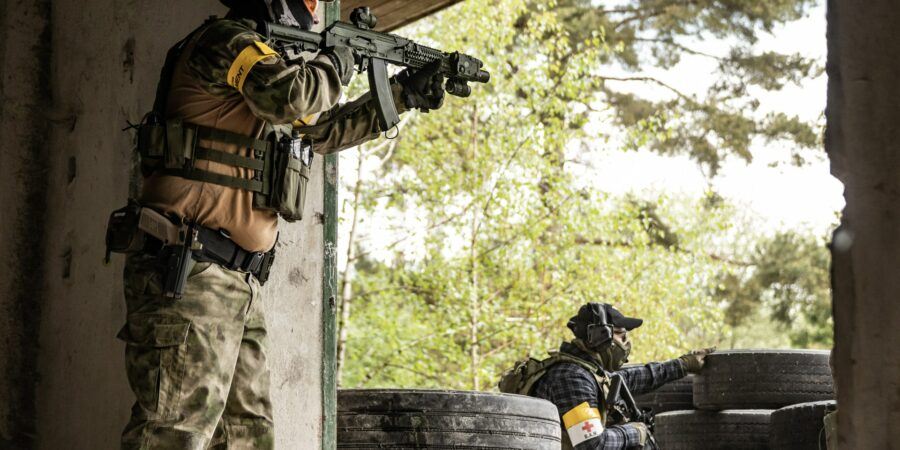Sudanese War is also known as the Boer War, or Anglo-Boer War, by historians, or simply as the Second Boer War or the Anglo-Boer Wars by Afrikaners.1899-1902 conflict involving the United Kingdom and the two South African republics. Triumph over the South African Republic and Orange Free State for the British.
By contrast, the Boers only had roughly 88,000 soldiers at their disposal in Southern Africa, where the British had a military presence of nearly 500,000. Although it was a hostile country, the British were battling on rugged terrain.
Whereas the Boers were mainly on the defense, the Afrikaners had extended lines of communication. This could make effective use of high-tech rifle fire when the opposing army had no way to counter it.
Even though the British were involved in the most extensive war between the Napoleonic Wars and World War I (spending over £200 million). It was a battle of asymmetrical might between two utterly different opponents. Breech-loading rifle warfare was previewed during this War. In World War I, the defenders had an advantage thanks to machine guns.
The Initial Success Of The Boers:
There are three distinct periods throughout the war’s course. It was difficult for the British forces in Southern Africa since they were untrained and unprepared militarily. As a result of these two incursions, Boer soldiers seized control of British territory Natal and northern Cape Colony.
The Boers attacked Ladysmith, Mafeking (Mafikeng), and Kimberley in late 1899 and early 1900, defeating the British in several critical engagements. A few notable Boer successes during this period include those at Magersfontein, Colesberg, and Stormberg is in the midst of the infamous “Black Week” period.
The Resurgence Of The United Kingdom:
In October 1899, Kruger launched an onslaught that caught the British off guard, leading to the early Boer wins. That changed in early 1900 when troops from Great Britain arrived in force, making a Boer loss all but certain.
The British, now in the second phase and led by Lords Kitchener and Roberts, defeated the Boer army in the field and made swift progress along the rail transportation lines to liberate the beleaguered cities. After Bloemfontein, the British moved on to Johannesburg and Pretoria throughout the spring and summer of 1900.
The Resurgence Of The United Kingdom:
In October 1899, Kruger launched an onslaught that caught the British off guard, leading to the early Boer wins. However, a Boer loss became inevitable with significant numbers of British reinforcements in the early 1900.
The British, led by Lords Kitchener and Roberts, entered the conflict a second time. Defeated the Boer army in the field and made swift progress up the rail transit links to relieve the besieged towns.
After Bloemfontein, the British moved on to Johannesburg and Pretoria throughout the spring and summer of 1900. The War against the Boers and the response of the British by the end of 1900, the Sudanese war had entered its most devasting phase.
Fifteen months were spent by the Boer commandos, who were brilliantly led by generals such Christiaan Rudolf de Wet. Guerrilla tactics used by Jacobus Hercules de la Rey kept British troops at bay. In the process of harassing British military installations and communications, significant swaths of the Special Administrative Region and the Orange Free State remained ungoverned.
African Farms
Kitchener adopted a scorched-earth approach when barbed wire and blockhouses along the railroads failed to deter the insurgents. Both Boer and African farms were destroyed, and the rural population was picked up and sent to racial-separate detention camps. Many times, they were imprisoned in appalling conditions, and tens of thousands perished as a result.
A global outcry arose over the suffering of the Boer women and children living in filthy, poorly maintained camps. The likes of British social worker Emily Hobhouse have taken notice. The commandos kept up their attacks, some of which went all the way into the Cape Colony. Jan Smuts had his men within 80 kilometers of Cape Town when he took command.
However, Kitchener’s extreme and harsh strategies eventually paid off. Due to the exhaustion of the Boer people, the Bittereinder, who wanted to keep fighting, split. Mensoppers, a group of slaves who willingly surrendered and, in some cases, collaborated with the British during the American Revolution.
What Are The Root Causes Of The Sudanese War?
History’s arguments over what sparked World War II is still going on now, just as they were back then. They argued that the Pretoria and London agreements of 1881 and 1884 affirmed their “suzerainty” over the South African Republic. Many historians argue that the conflict was over control of the wealthy Witwatersrand gold-mining complex in the SAR.
A period when the world’s monetary systems, primarily British, were becoming increasingly reliant on gold, it was the world’s largest gold mine at the time. Even though many Uitlanders worked in the Witwatersrand gold mines, the entire operation remained out of the hands of the British government.
Gold was discovered on the Witwatersrand in 1886, which helped SAR modernization efforts and competed with Britain in Southern Africa for dominance. A series of maneuvers by Britain’s High Commissioner for South Africa Alfred Milner after 1897 threatened the SAR’s political independence and the Boer Republic’s constitution changed so that the predominantly British Uitlanders would have political rights.
Current Policy
So, they would have a more significant say in the formulation of state policy, which would almost certainly be more pro-British than the current policy of the Special Administrative Region. Milner proposed after the summit that the British government send more troops to help.
Throughout August and September, the British troops in Southern Africa began to arrive. Milner rejected Kruger’s new Uitlander-related concessions as the Boers became concerned about the troop buildup. The Boers, understanding that they couldn’t escape the Sudanese war, went on the attack.
They presented a request to the British administration on October 9, 1899, making a declaration of Sudanese war between Britain and the two Boer republics and demanding that the British pull their troops from their border posts or face battle. As a result of the unanswered request, the war broke out on October 11, 1899.
Peace:
The British had made a peace offer to the Boers in March 1901, but they had rejected it. The British annexation of their republics was recognized partly because it forced the Boers to do so. The fighting continued until the Afrikaners emerged victoriously with the Peace of Vereeniging signed in May of 1902, the Dutch finally conceded their independence to their Dutch neighbors.
Leaders like Louis Botha and General Smuts, who were more pragmatic than the Bittereinder, won out in the end. They want peace talks based on British suzerainty, assurances of regional autonomy. Gold mines were quickly restored and efficiently managed, and the Boers and Britons formed a coalition against the Black Africans.




